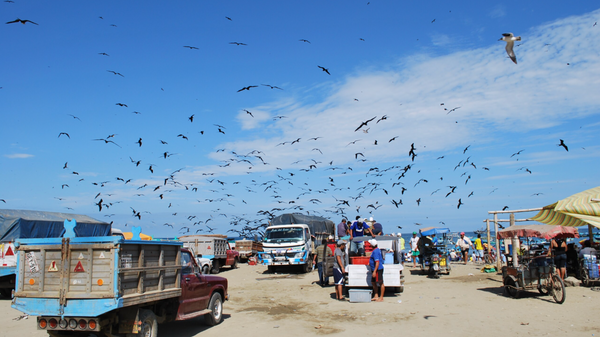
As a far-right march commemorating Nazi forces in the second world war passed through Budapest on Sunday, a mural was painted on a wall imagining the death by hanging of the Italian anti-fascist activist Ilaria Salis. The 39-year-old, a teacher from northern Italy, has been held in prison in Hungary since her arrest last year and, last month, was brought into court in chains on charges of attempted assault.
Her father, Roberto Salis, told the Guardian in an interview that he feared for his daughter’s safety and emphasised the urgency of bringing her back to Italy as soon as possible. Her case has triggered a formal diplomatic protest from the Italian government and dozens of rallies in her home country demanding her return.
“The recent neo-Nazi demonstration in Budapest and that mural confirm my fears about the danger that my daughter continues to be in while she is held in Hungary,” he said. “We already know that on Telegram channels, far-right militants were saying they wanted to put Ilaria in a wheelchair.”
Salis, from Monza, near Milan, was arrested in the Hungarian capital in February 2023 after a counter-demonstration against a neo-Nazi rally. She was charged with three counts of attempted assault and accused of being part of an extreme leftwing organisation.
She denies the charges, which carry a sentence of up to 24 years in prison.
In a letter to her lawyer, she detailed the conditions she had faced since her arrest – cells infested with rats and bugs, not being allowed to wash for days on end, and a lack of urgent medical care.

The Hungarian Helsinki Committee, a human rights organisation, said her case had “brought the state of Hungarian prisons to international attention”. It said the routine use in Hungary of physical restraints on defendants in court was “against EU law and domestic legal standards”.
Her father said: “We managed to briefly speak with my daughter only on 7 September 2023, which was seven months after her arrest. At that time, my daughter decided not to tell us anything about the degrading conditions she was detained in. I know her. She’s not the type to worry us. But when I read the letter she had written to the lawyers, as a father, I knew I had to do something, and we started a media campaign to denounce the case.”
In Rome, where a mural now shows Salis breaking her chains, the case could be embarrassing for Giorgia Meloni, the Italian prime minister, who along with the deputy prime minister, Matteo Salvini, has close ties with Viktor Orbán, Hungary’s nationalist PM, even though Meloni and Orbán have diverged over EU support for Ukraine.

Media reports in Italy have suggested Salis has been caught up in demands from the Hungarian government in exchange for her extradition, such as Rome’s support for an increasingly isolated Hungary within the EU.
“The fear I have is that the case may be exploited,” said Salis. “Not only at the Hungarian level, but also at the Italian level. This is a case that lends itself to being exploited. And this would only cause even greater damage to the mental and physical health of my daughter.”
Salvini and his League party have repeatedly criticised Salis, and alleged she was part of a group that damaged a gazebo used by the party in Monza in February 2017.
Salis’s lawyers have said she was acquitted in relation to that case.
When asked about Salvini’s words, Salis’s father said: “There are great men and small men, there are great women and small women. Each one decides which category they want to belong to.”

He has said the family intends to sue Salvini for defamation, while Salis’s lawyers are considering appealing to the European court of human rights over her treatment.
The Italian foreign minister, Antonio Tajani, who has already summoned the Hungarian ambassador in protest, said “this time it seems to me [Hungary] has gone too far” and that “treating a prisoner in that way really seems inappropriate, not in tune with our legal culture”.
According to government sources, Italy aims to persuade Budapest to allow Salis to be placed under house arrest in Hungary. But her family fears this would expose her to the risk of retaliation by far-right groups.
“[It] is too dangerous for our daughter,” her father said. “We will continue to demand that Ilaria be allowed to serve her sentence in Italy. Assuming that my daughter is guilty of the crimes attributed to her, in Italy one year of prison that she has already served would be more than enough punishment. If my daughter has to be punished, it is only right that it be with a sentence that would be acceptable even in our country. It is absurd to think that for such crimes she risks facing 24 years in prison.”
He added: “My daughter went on 11 February 2023 to protest against the neo-Nazi march […] Just imagine if in Germany the neo-Nazis celebrated crossing the Maginot Line in France. It is worrying that in Europe a country is allowed to host – not condemn, not ban, and not prevent – such a march. I believe that those who would like Europe to be different should act to prevent these demonstrations.”
Hungary has defended its treatment of Salis. “Sure, she was restrained in the courtroom, and yes, she had already spent 11 months in detention,” Hungary’s government spokesperson, Zoltán Kovács, wrote on X. “But ‘inhumane’? Not really, no. Taken seriously due to the severity of the crime she’s charged with, more likely.”







